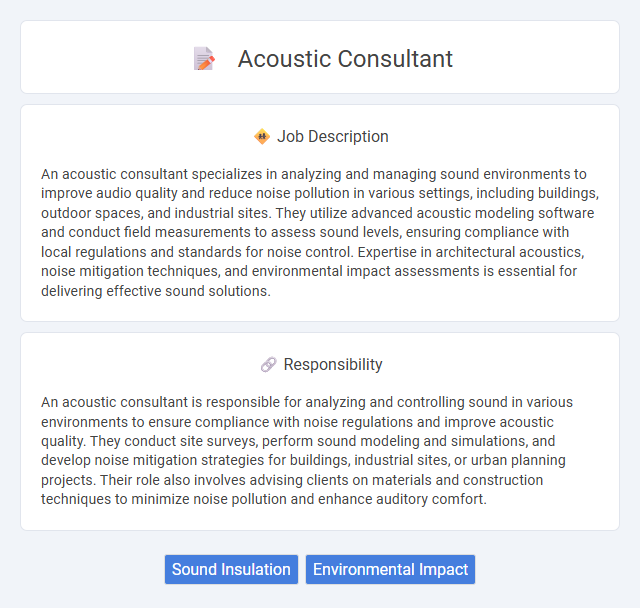
An acoustic consultant specializes in analyzing and managing sound environments to improve audio quality and reduce noise pollution in various settings, including buildings, outdoor spaces, and industrial sites. They utilize advanced acoustic modeling software and conduct field measurements to assess sound levels, ensuring compliance with local regulations and standards for noise control. Expertise in architectural acoustics, noise mitigation techniques, and environmental impact assessments is essential for delivering effective sound solutions.
Individuals with a keen ear for detail and strong analytical skills are likely to find an acoustic consultant role suitable. Those who enjoy working in diverse environments, managing sound quality, and applying scientific principles may thrive in this position. People who prefer routine tasks or have difficulty focusing on technical data might face challenges adapting to the dynamic nature of this job.
Qualification
Acoustic consultants typically require a degree in acoustics, physics, environmental science, or engineering, often complemented by professional certifications such as the Institute of Acoustics (IOA) membership. Strong knowledge in sound measurement, noise control regulations, and acoustic modeling software is essential for accuracy in assessments and recommendations. Practical experience in conducting site surveys and interpreting acoustic data ensures compliance with environmental and building standards.
Responsibility
An acoustic consultant is responsible for analyzing and controlling sound in various environments to ensure compliance with noise regulations and improve acoustic quality. They conduct site surveys, perform sound modeling and simulations, and develop noise mitigation strategies for buildings, industrial sites, or urban planning projects. Their role also involves advising clients on materials and construction techniques to minimize noise pollution and enhance auditory comfort.
Benefit
Hiring an acoustic consultant is likely to improve sound quality and ensure compliance with noise regulations, reducing the risk of costly legal issues. Their expertise can enhance building design, creating more comfortable and productive environments. Engaging such a specialist may ultimately increase property value by addressing acoustic challenges effectively.
Challenge
An acoustic consultant job likely involves complex challenges related to analyzing and controlling sound within various environments, where predictive modeling of noise impact and mitigation strategies play a crucial role. The role probably requires navigating strict regulations and adapting solutions to unique architectural features, making problem-solving and technical expertise essential. Balancing client expectations with practical acoustic solutions may present ongoing difficulties that test the consultant's skill and creativity.
Career Advancement
Acoustic consultants specialize in analyzing and managing sound environments to reduce noise pollution and improve audio quality, essential in construction, urban planning, and product design. Career advancement opportunities include progressing to senior consultant, project manager, or technical director roles, often requiring expertise in advanced acoustic modeling, regulatory compliance, and client management. Professional certifications such as those from the Institute of Acoustics (IOA) enhance credibility and open doors to leadership positions and specialized consultancy projects.
Key Terms
Sound Insulation
Acoustic consultants specializing in sound insulation assess and design solutions to minimize noise transfer between spaces, ensuring compliance with building regulations and industry standards. They utilize advanced measurement tools and modeling software to analyze sound transmission and recommend materials or construction techniques that enhance acoustic performance. Expertise in both airborne and impact sound insulation is essential for delivering effective noise control in residential, commercial, and industrial environments.
Environmental Impact
Acoustic consultants specializing in environmental impact assess noise pollution levels and develop mitigation strategies to comply with regulatory standards. They conduct site surveys, analyze sound data, and prepare detailed reports to support planning applications and environmental impact assessments. Their expertise ensures projects minimize noise disturbance to surrounding communities and ecosystems.
 kuljobs.com
kuljobs.com